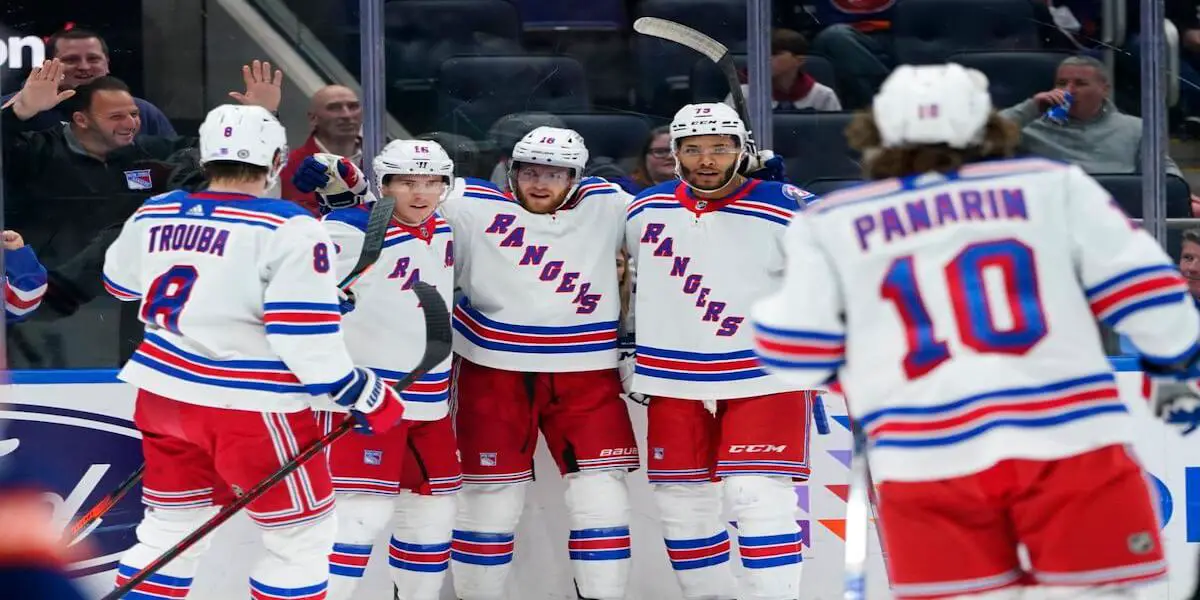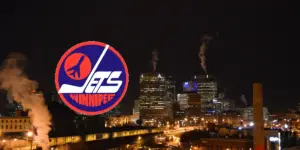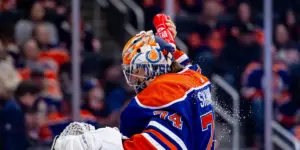
I’ll need to start with a bit of an exhale here: I love Panarin as a player and a person, and I think Trouba is one of the best character guys the Rangers have had in the locker room for a long time. I have nothing but the utmost respect for what both of them have done with their time as Rangers. But the best thing that could happen for this team now is for both of them to go.
Panarin is the more scalding part of this take. He’s been one of the best wingers in the game since joining the league at 24 years old. At 31 years old, he’s still well over a point-per-game player and regularly racks up highlight reel plays. But that’s only part of the story. While producing points is an obvious plus, his production is starting to slow, and his mistakes are becoming more routine. Lots of bad blind passes and giveaways trying to force what isn’t actually there. His defensive play has improved this year and is backed by eyes and analytics. He was among the laziest back checkers in the league last year but has committed himself to playing all over the ice and to noticeable effect. His Evolving Wild player chart has his four percentile defensive rank last year up to 31 percentile this season. Still not good, but an improvement all the same.
Unfortunately, the same cannot be said about his offensive production. Four years ago, Panarin’s offensive rank was 99%. Three years ago, 88%. Then 80%. And now, halfway through this season, 78%. This shouldn’t be a massive shock. After all, most players peak around 27-28 years old, with a few outlying exceptions. And even with these declining numbers, it’s not as if Panarin is a drag on the team. Except he is in one critical area: cap space. If you take his actual pay this year and not his contract’s AAV, he’s the second-highest-paid player in hockey this year. I’m not sure even the most diehard fan would argue his play matches his pay, and an honest assessment of his likely future production would expect this trend to continue, not to be bucked.
Trouba’s story is different, but the end result is the same. He’s never been strong defensively, even in his best years in Winnipeg; he was a scoring defenseman and a big hitter but not a stalwart defender. His offensive production as a Ranger has never come close to reaching his heights in Winnipeg, and his defensive numbers keep trending down, year over year. Keen observers have noted how quickly it appeared that his partner K’Andre Miller was covering for his defensive lapses instead of the other way around, as Rangers management likely assumed would be the case. Next year, the last year before his NMC becomes a modified 15-team no-trade list, he will make 8 million dollars. With how his numbers look, even half that would be a generous contract the Rangers should question keeping on the books.
Between the two of them, they’ll earn a combined 19 million dollars next year. It’s not difficult to think of better ways to spend that money. It’s not just that there is better value for the money to be had either; you can argue Panarin is taking away valuable opportunities from the Rangers’ young talent to play in the top 6 and get PP1 time. You can also say that Trouba’s positionless defense is keeping Miller from taking the next step and taking what should already be his spot quarterbacking PP2.
At this point, you should probably be saying, “OK, that’s all well and good, but both have NMCs for several more years, and we can’t do anything about it.” And you’re right. It’s highly unlikely either would be willing to waive their NMC to get moved. This is mostly a hypothetical argument to make a different point altogether—the Rangers rebuild was rushed. On the back of a historic season from Shesterkin, they’ve forced open a window the Rangers doubled down on with overpriced veteran signings like Trocheck. Unless the Rangers are able to cash in on a cup this year, a likely cap crunch means we’ll be saying goodbye to at least one of their young first-round draft picks. Even with conservative contracts, It’s hard to fit Chytil, Laffy, Miller, and Kravtsov into the roster without offloading the few movable contracts we have, like Goodrow and Lindgren. Projecting out into the future, guys like Panarin, Trocheck, Zibanejad, and Kreider aren’t likely to produce at the same clip they’re at now, and with the bulk of their once unrivaled young draft pool graduated to the NHL, it’s hard to see where their contention window actually is. The win-now mandate that’s been issued from the top has forced an untenable roster construction, and the way it looks to me, it really is a win-now situation for the Rangers.

Back to Rants – Ranting Rangers: A New York Rangers Podcast
Discover more from Inside The Rink
Subscribe to get the latest posts sent to your email.



